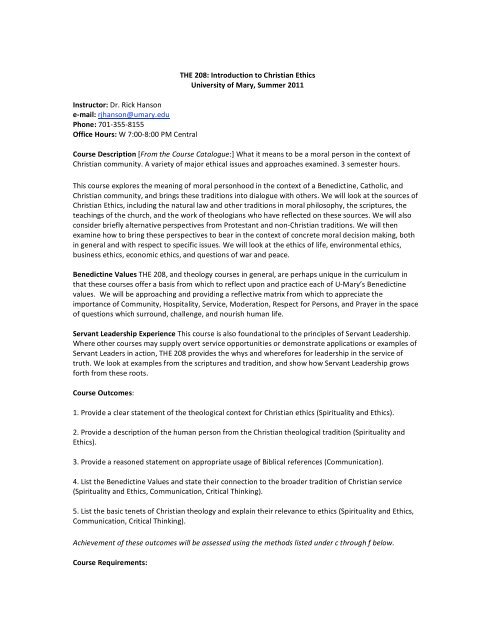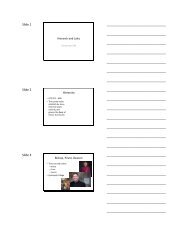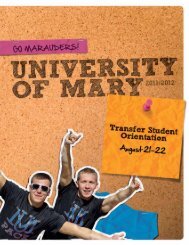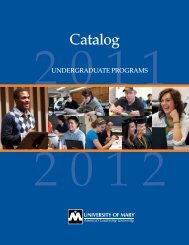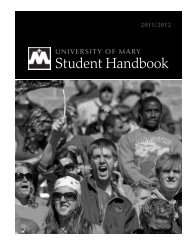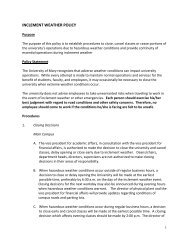Page 1 THE 208: Introduction to Christian Ethics University of Mary ...
Page 1 THE 208: Introduction to Christian Ethics University of Mary ...
Page 1 THE 208: Introduction to Christian Ethics University of Mary ...
You also want an ePaper? Increase the reach of your titles
YUMPU automatically turns print PDFs into web optimized ePapers that Google loves.
<strong>THE</strong><strong>208</strong>:<strong>Introduction</strong><strong>to</strong><strong>Christian</strong><strong>Ethics</strong><strong>University</strong><strong>of</strong><strong>Mary</strong>,Summer2011Instruc<strong>to</strong>r:Dr.RickHansone‐mail:rjhanson@umary.eduPhone:701‐355‐8155OfficeHours:W7:00‐8:00PMCentralCourseDescription[FromtheCourseCatalogue:]Whatitmeans<strong>to</strong>beamoralpersoninthecontex<strong>to</strong>f<strong>Christian</strong>community.Avariety<strong>of</strong>majorethicalissuesandapproachesexamined.3semesterhours.Thiscourseexploresthemeaning<strong>of</strong>moralpersonhoodinthecontex<strong>to</strong>faBenedictine,Catholic,and<strong>Christian</strong>community,andbringsthesetraditionsin<strong>to</strong>dialoguewithothers.Wewilllookatthesources<strong>of</strong><strong>Christian</strong><strong>Ethics</strong>,includingthenaturallawandothertraditionsinmoralphilosophy,thescriptures,theteachings<strong>of</strong>thechurch,andthework<strong>of</strong>theologianswhohavereflectedonthesesources.WewillalsoconsiderbrieflyalternativeperspectivesfromProtestantandnon‐<strong>Christian</strong>traditions.Wewillthenexaminehow<strong>to</strong>bringtheseperspectives<strong>to</strong>bearinthecontex<strong>to</strong>fconcretemoraldecisionmaking,bothingeneralandwithrespect<strong>to</strong>specificissues.Wewilllookattheethics<strong>of</strong>life,environmentalethics,businessethics,economicethics,andquestions<strong>of</strong>warandpeace.BenedictineValues<strong>THE</strong><strong>208</strong>,andtheologycoursesingeneral,areperhapsuniqueinthecurriculuminthatthesecourses<strong>of</strong>ferabasisfromwhich<strong>to</strong>reflectuponandpracticeeach<strong>of</strong>U‐<strong>Mary</strong>’sBenedictinevalues.Wewillbeapproachingandprovidingareflectivematrixfromwhich<strong>to</strong>appreciatetheimportance<strong>of</strong>Community,Hospitality,Service,Moderation,RespectforPersons,andPrayerinthespace<strong>of</strong>questionswhichsurround,challenge,andnourishhumanlife.ServantLeadershipExperienceThiscourseisals<strong>of</strong>oundational<strong>to</strong>theprinciples<strong>of</strong>ServantLeadership.Whereothercoursesmaysupplyovertserviceopportunitiesordemonstrateapplicationsorexamples<strong>of</strong>ServantLeadersinaction,<strong>THE</strong><strong>208</strong>providesthewhysandwhereforesforleadershipintheservice<strong>of</strong>truth.Welookatexamplesfromthescripturesandtradition,andshowhowServantLeadershipgrowsforthfromtheseroots.CourseOutcomes:1.Provideaclearstatemen<strong>to</strong>fthetheologicalcontextfor<strong>Christian</strong>ethics(Spiritualityand<strong>Ethics</strong>).2.Provideadescription<strong>of</strong>thehumanpersonfromthe<strong>Christian</strong>theologicaltradition(Spiritualityand<strong>Ethics</strong>).3.Provideareasonedstatemen<strong>to</strong>nappropriateusage<strong>of</strong>Biblicalreferences(Communication).4.ListtheBenedictineValuesandstatetheirconnection<strong>to</strong>thebroadertradition<strong>of</strong><strong>Christian</strong>service(Spiritualityand<strong>Ethics</strong>,Communication,CriticalThinking).5.Listthebasictenets<strong>of</strong><strong>Christian</strong>theologyandexplaintheirrelevance<strong>to</strong>ethics(Spiritualityand<strong>Ethics</strong>,Communication,CriticalThinking).Achievemen<strong>to</strong>ftheseoutcomeswillbeassessedusingthemethodslistedundercthroughfbelow.CourseRequirements:
a.ReadingAssignments.Studentsshouldreadandspendtimeanalyzingallreadingassignments.Youmayfindsome<strong>of</strong>thesereadingschallenging.Thelecturenotesanddiscussionboardquestionsshouldhelpyoumakesenseou<strong>to</strong>fthem,butdon’thesitate<strong>to</strong>askforhelpifyouneedit(foundational<strong>to</strong>allcourseoutcomes).b.Lecturenotes.Thelecturenotesareyourguide<strong>to</strong>whatismostimportantinthereading,and<strong>to</strong>themainconceptsyouneed<strong>to</strong>master(foundational<strong>to</strong>allcourseoutcomes).c.DiscussionBoards.Studentswillbeexpected<strong>to</strong>participateactivelyinthediscussionboardseachweek<strong>of</strong>thecourse.Theyshouldexpect<strong>to</strong>makeatleas<strong>to</strong>nemajorposting(250wordsormore)<strong>to</strong>eachquestionposed,and<strong>to</strong>respond<strong>to</strong>atleast5postsbythepr<strong>of</strong>essorand/orfellowstudentsperweek/session.Postsshouldhaveaclear,well‐definedthesis,makeanargument,andwhereappropriate,respondthoughtfully<strong>to</strong>argumentsmadebyothers(outcomes1and5).PointValue:250<strong>to</strong>tal,25/week.d.Analysispapers.Studentswillprepare4short(500‐750word)papersanalyzingandinterpretingkeytextsandresponding<strong>to</strong>keyissuesrelated<strong>to</strong>the<strong>Christian</strong>traditioninethics.Thesepaperswillbechosenfromthequestionslistedunderthe“Homework”section<strong>of</strong>eachsession.PapersaredueonthecorrespondingSaturdaynigh<strong>to</strong>fthesecond,fourth,sixth,andeighthweeksby10:00PMCentralTime.Youmayturninmorethanfourpapers,bu<strong>to</strong>nlythehighestfourgradeswillcount(outcomes2,4and5)PointValue:250<strong>to</strong>tal;Firstanalysispaperisworth25,secondisworth50,thirdisworth75,fourthisworth100e.Positionpaper.Studentswillprepareonemajorpaper(2500‐5000words)inwhichtheytakeanddefendapositiononakeyethicalissueinthecontex<strong>to</strong>ftheongoingdebatearoundthatquestion(outcomes2,3,4,and5)PointValue:250Note:Thesethreeassignmentsbuildoneachother.Youwillnoticethatthediscussionquestionsaresimilarorinsomecasesidentical<strong>to</strong>theanalysispaperquestions.Youmayuseadiscussionpostasthebasisforananalysispaper,butnotethedifferencesbetweenthem.Thediscussionpostsshouldbearound250words(orlessforresponses<strong>to</strong>otherposts)andmaybeinformalandreflect“thinkingoutloud.”Analysispapersshouldbe500‐750wordsandshouldbewellorganizedwithathesis,argumentsupportingthethesis,andaconciseconclusion.Mostpositionpaperswillbeon<strong>to</strong>picsaddressedinthecourseandyoucanuseyouranalysispaperonthat<strong>to</strong>picasastartingpoint,butnotethatwhiletheanalysispapersfocusonexplainingthearguments<strong>of</strong>others,yourpositionpapershouldtakeanddefendaposition<strong>of</strong>yourown,whileaddressingcounterargumentsfromotherpoints<strong>of</strong>view.f.Essayexaminations.Studentswillsubmitessayexaminationsatthemid‐termandattheend<strong>of</strong>thesemester.Theseexaminationswillconsis<strong>to</strong>fshortessaysdesigned<strong>to</strong>givestudentsanopportunity<strong>to</strong>synthesizeanddemonstratetheirknowledge<strong>of</strong>theethicaltheorytheyhavestudiedoverthecourse<strong>of</strong>thesemester(outcomes1through5)PointValue:Midterm100,Final150.Yourgradewillbecalculatedbyaddingupyourpointsusingthescalebelow.
EvaluationandGrading:GradingScale935=A900=A‐865=B+835=B800=B‐765=C+735=C700=C‐665=D+635=D600=D‐599andbelow=FRequiredTexts:Bible–anystandardtranslationwilldo,butitshouldincludethe“apocryphal”textsusedbytheCatholicChurch.Lookfor“withapocryphals/dueterocanonicals”orasimilarstatemen<strong>to</strong>nthecoverorinthefirstpages<strong>of</strong>yourtranslation.TheNewRevisedStandardVersion(NRSV)isagoodplace<strong>to</strong>startifyou’reunsure<strong>of</strong>whichtranslation<strong>to</strong>use.Catholic<strong>Ethics</strong>InToday’sWorld:RevisedEditionJozefD.Zalot&BenedictGuevin,OSB.AnselmAcademic,2011.Additionalreadingswillbeavailableonline.PoliciesandProcedures:AttendancePolicyStudentsareexpected<strong>to</strong>participateeachweek.Studentswhohavenotparticipatedforthreeconsecutiveweeksandwhohavenotmadearrangements<strong>to</strong>makeuptheworkmaybedroppedfromthecourse.[WORK]PolicyRegardingAssignmentsTestsAllassignments/quizzes/testsreceivepointswhichcount<strong>to</strong>wardthefinalgrade.Lateassignmentsmayreceive2pointslesscreditperdaytheassignmentislate.DecorumDiscussionisintegral<strong>to</strong>oursuccessasaclass.Inthecourse<strong>of</strong>ourdiscussions,some<strong>to</strong>picsmaylead<strong>to</strong>disagreement.Bearinmindthatdisagreementanddisrespectaretwoverydifferentthings.Mutualrespectforotherstudents’feelingsandideasisexpectedandwillbeenforced.Studentswhoareconsistentlydisrespectful<strong>to</strong>others(intheinstruc<strong>to</strong>r’sjudgment)willbeasked<strong>to</strong>leaveclass.Yourquestions,insights,andotherinputareessential<strong>to</strong>theconten<strong>to</strong>fthiscourse(seeParticipation),butthesemustbeputforthinacourteousandrespectfulmanner.Studentswhochoosenot<strong>to</strong>abidebytheserulespertaining<strong>to</strong>classdecorummaybedroppedfromthecourse(instruc<strong>to</strong>rreservestheright<strong>to</strong>makethisjudgment).StudentExpectationsSincethisisa3‐semestercredit,10‐weekundergraduatelevelcourse,youcanexpect<strong>to</strong>spendapproximately4.5hoursperweekinstructionaltimeandanother9hoursperweekstudyingoutside<strong>of</strong>instructionaltime.Instructionaltimeincludesreadingandrespondinginthediscussionboard.
TraditionandReason:TheRole<strong>of</strong>theMagisterium,MoralActandConscienceZalot,JozefandGuevin,Benedict.Catholic<strong>Ethics</strong>inToday’sWorld.ChapterTwo.Aquinas,Thomas.SummaTheologiae,I‐IIq19a5Theological<strong>Ethics</strong>:TheCatholicTraditionAquinas,Thomas.SummaTheologiae,I‐IIq91TheBenedictineTraditionwww.umary.eduSessionFourTheHumanPersonAquinas,Thomas.SummaTheologiae,I‐II.q3a8VirtueAquinas,Thomas.SummaTheologiae,I‐IIq55a4,q62SessionFiveCatholicSocialTeachingZalot,JozefandGuevin,Benedict.Catholic<strong>Ethics</strong>inToday’sWorld.ChapterThree.SessionSixTheological<strong>Ethics</strong>:TheProtestantTraditionMenuge,AngusJ.L..Niebuhr'sChristandCultureReexaminedLuther,Martin.Concerning<strong>Christian</strong>Liberty,selectionsCalvin,John.Institutes<strong>of</strong>the<strong>Christian</strong>Religion,selectionsSessionSevenSexualMoralityZalot,JozefandGuevin,Benedict.Catholic<strong>Ethics</strong>inToday’sWorld.ChapterNine.EthicalIssuesRelatedToLife:TheDeathPenaltyZalot,JozefandGuevin,Benedict.Catholic<strong>Ethics</strong>inToday’sWorld.ChapterSix.SessionEightEthicalIssuesRelatedToLife:Medical<strong>Ethics</strong>Zalot,JozefandGuevin,Benedict.Catholic<strong>Ethics</strong>inToday’sWorld.ChapterEightSessionNineEnvironmental<strong>Ethics</strong>Business<strong>Ethics</strong>Zalot,JozefandGuevin,Benedict.Catholic<strong>Ethics</strong>inToday’sWorld.ChapterFour.SessionTenGlobalEconomicsZalot,JozefandGuevin,Benedict.Catholic<strong>Ethics</strong>inToday’sWorld.ChapterFive.
WarandPeaceZalot,JozefandGuevin,Benedict.Catholic<strong>Ethics</strong>inToday’sWorld.ChapterSeven.ReviewandSynthesisProjectDiscussion


